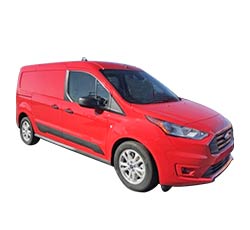2020 Ford Transit Connect Pros vs Cons
When it comes to cars, James Murdock has the real-world experience to back it up. With an economics degree and over 20 years running the family dealership, he's managed it all - from sales to service and marketing. His role is to provide his expert opinion on vehicle performance and value. He meticulously fact checks all features and data with vehicle manufacturers to ensure the upmost accuracy.
Ready to tackle small streets and busy urban spaces, the 2020 Ford Transit Connect was built for today's hauling challenges. It may be small, but it has big payload numbers. The urban lifestyle is also reflected in its list of standard and optional high-tech features.
What's New for 2020?
Since the 2020 Ford Transit Connect is designed to help with urban challenges, it is only logical that Ford would add standard and optional driver assistance. This can bring it in line with most passenger vehicles that it shares the road with. It certainly makes driving easier, safer and more predictable. Avoiding trouble is one sure way to watch the bottom line.
In the last model year, the van got a new transmission, a better suspension, and updated styling. Shoppers choose between a regular wheelbase and a long wheelbase. Seating is 2 or 5 for work vans and six or seven for passenger vans.
Ten Reasons You May Like the 2020 Ford Transit Connect – The Pros
1. Fuel Economy
Bad fuel economy is the enemy of many businesses. The 2020 Ford Transit Connect lets you change the equation. Fuel economy is 27 miles per gallon on the highway and 24 miles per gallon in the city. With the number of miles driven every day by vans, the savings could add up quickly. Better fuel economy should also mean fewer stops for gas, allowing the driver to focus on deliveries.
Automatic stop/start technology reduces fuel waste during city driving. Every long idle will trigger a pause in engine activity. The van turns back on as the driver takes a foot from the brake and moves it to the accelerator. The savings will add up quickly.
2. Drivability
The van has front-wheel drive, and that allows it to feel more like a regular personal vehicle than a commercial one. Drivers will appreciate the smooth handling and predictable response. Rivals, such as the Mercedes-Benz Metris, have the traditional rear-wheel drive that is often found on pickup trucks.
Just as it should be, Ford's city van is very agile around town. The smart build ensures well-controlled body motions. Accurate steering makes it easier for the driver to handle difficult maneuvers. In comparison, the ProMaster City van has a thin build that makes it less stable and more unpredictable.
An eight-speed automatic transmission allows the Ford Connect Transit to make more out of every horse under the hood. It certainly harnesses the torque when needed for big loads and difficult uphill climbs. Many rivals still have six-speed automatics.
3. Standard Forward-collision Warning and Automated Emergency Braking
Ford has equipped its city van with the most important driver assistance technology. A forward collision warning gives drivers a good chance to brake before rear-ending another vehicle. Automatic emergency braking can shave seconds off the stop when seconds really count. No other van has these features, unless they are options.
For businesses, fewer wrecks mean lower repair bills, less down time, and better insurance rates. It certainly means less hassle for everyone who might have been involved in an accident.
4. Standard Exterior Safety Aids
For 2020, automatic headlamps are standard. Configurable running lights are also standard. Between these two features, you can be sure that other drivers can see your van and hopefully avoid any potential collision.
Exclusive in this class, rain-sensing windshield wipers will turn themselves on and off. Busy drivers won't have to take their hands off the wheel, but they will have the visibility they need. This is just another way that the Ford van reduces the chances of accident scenarios.
5. Advanced Driver Assistance is Available
Just as today's commuter relies on adaptive cruise control, the 2020 Ford Transit Connect driver can enjoy the same advantage. This available system allows the van to speed or slow as conditions dictate. It can be used in busier traffic, providing stress relief for the driver.
Lane-keeping assist is a good partner for adaptive cruise control. As the van moves forward, the system's cameras are watching the lane lines. If it detects that the wheels are traveling out of the lane, it will signal the driver. It may also steer to help the driver correct the van's trajectory.
6. Warning Systems Reduce the Chances of an Accident
Another way the 2020 Ford Transit Connect seeks to lead the pack is by providing warning systems. A blind-spot monitor reduces the chances that the van will side-swipe a neighbor. It warns the driver about traffic that pulls alongside the van.
The rear cross-traffic alert watches for traffic dangers while the van is in reverse. These two systems should help drivers stay out of harm's way. That saves wear and tear on the van and lowers the need for insurance claims. Neither of these systems are on rivals Ram ProMaster City or Nissan NV200.
7. XLT is Value Edition
Employers are recognizing the value of connectivity and crash avoidance technology. As such, Ford offers the XLT edition. It has a full touch screen with built-in navigation. That should keep your deliveries on time as drivers find the fastest route.
Bluetooth, Apple CarPlay and Android Auto provide connectivity that helps a driver stay in touch with the office. An available Wi-Fi hotspot turns the van into an office on the go. These features boost productivity while providing more entertainment for the driver.
This edition also has a standard blind spot monitor and rear cross traffic alert. These have been shown to reduce common crash scenarios. Since this van is sure to visit many parking lots and side streets, the rear cross traffic alert should prevent fender benders that cause delays and cost money.
8. Ergonomic Cabin Fits the Driver Better
Another aspect of this van's urban mindset is the design emphasis on the driver. The driving position is lower, and the 2020 Ford Transit Connect driver can feel more like they are commanding a regular passenger vehicle.
Every aspect of the cockpit has been angled toward the driver for maximum ergonomics. The tactile buttons are easy to reach and to use. These operate the climate system, radio and other functions. Available on this Ford, dual-zone automatic climate controls are a rare option in this segment.
9. Perfectly Proportioned for Urban Use
The Transit Connect is a vehicle that can go where other vans can't or shouldn't. Ford follows through on making this vehicle easier to handle when taking back alleys or finding a way through packed parking lots. Yet its big payload ensures that it is still a worthwhile hauler.
As one of the smallest vans, the 2020 Ford Transit Connect has a 38-foot turning circle. That's tighter than many rivals, and it makes this van more maneuverable in busy spaces. It's certainly needs less space to park than a big van would.
10. Carlike Ride Quality
Although this is a van, the ride quality is quite good. Gas-pressurized shock absorbers help to absorb road bumps and dips. This allows passengers to feel less jarring and bouncing. It's also good for the cargo which should receive fewer jolts. Rivals, such as the Nissan NV200, are criticized for their poor suspensions.
Reasons You May Not Like the 2020 Ford Transit Connect – The Cons
1. Smaller Size
For all of the ways that the smaller size benefits many businesses, some will find that the Transit Connect is too small. The Mercedes-Benz Metris slots just above this van, and the cost difference isn't too great. Yet stepping up to that van adds dozens more cubic feet of cargo space. On the other hand, if you are spending more, you may want to step up to the Ford Transit.
2. Lower Power
The four-cylinder powertrain produces 162 horsepower and 144 pound-feet of torque. That's low when compared with its closest competitor. The Ram ProMaster City four-cylinder engine produces 178 horsepower and 174 pound-feet of torque. Another competitor, the Mercedes-Benz Metris, uses turbo power to produce 208 horsepower and a higher rate of torque.
3. No All-Wheel Drivetrain
If Ford offered an all-wheel drivetrain, the Connect Transit would be an even better urban hauler in cold climates. It has good traction, but any vehicle can use some four-wheel drive capability if it has to encounter snow.
How It Stacks Up to the Competition:
If you are comparing the 2020 Ford Transit Connect to its most direct competitor, you are looking at the 2020 Ram ProMaster City Van. Although it has more power than the Transit Connect, it doesn't have higher trailering capacity. Transit Connect payload is 1570 pounds compared to about 1880 pounds in the Promaster City Van.
It should be noted that the ProMaster lacks the connectivity of Apple CarPlay or Android Auto. It has a less capable touch screen system. Furthermore, it lacks the many driver assistance features that are either standard or options on the 2020 Ford Transit Connect. Ford's automatic emergency braking is reason enough to favor its van over the Ram.
The Nissan NV200 is another competitor. Its 2.0-liter I-4 engine is underpowered for the job. It is rated 131 horsepower and 139 pound-feet of torque. It can handle 1500 pounds of payload, slightly less than the Transit Connect. Combined fuel economy is good, but it can't match the Ford.
The Nissan van's main appeal is that it is cheaper than its rival, but the interior appointments and overall package don't match the quality in the Ford. It also doesn't offer advanced safety equipment as an option.
If the Transit Connect doesn't haul enough, it is only logical to step up to the full-size Transit. It can handle 3,680 pounds of payload. It tows 5,400 pounds. A tall roof height allows workers to stand up inside the van. Passenger versions seat up to 12.
Conclusion
The 2020 Ford Connect Transit makes a case that smaller is better. Good fuel economy, effective urban maneuvering, and ample payload numbers should position it for a place on any business team. For individuals who only need one van, this modestly-sized hauler is a logical pick.
• 2020 Ford EcoSport
• 2020 Ford Edge
• 2020 Ford Escape
• 2020 Ford Expedition
• 2020 Ford Explorer
• 2020 Ford F-150
• 2020 Ford F-250
• 2020 Ford Fusion
• 2020 Ford Fusion Energi
• 2020 Ford Mustang
• 2020 Ford Ranger
• 2020 Ford Transit Connect


